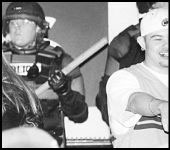WHILE ATTORNEYS FOR accused Mardi Gras killer Jerell Thomas seek to review unaired TV tape in hopes of exonerating their teenage client, prosecutors have successfully used other videotaped violence to rack up their first Fat Tuesday riot convictions. Thanks also to video, amended charges have been filed in a seemingly sporadic shooting spree that, tape replays show, allegedly was intentional and could have led to other festival deaths.
Paul Rafael Dervin, 18, has pleaded not guilty to assault and rioting charges stating he fired five shots from a chrome gun as he ran through a crowd of revelers—and past a TV camera—wounding at least one man (an earlier charge of wounding a second man has been dropped).
Though it seemed on TV that gang-banger Dervin was shooting in the air, he was aiming at a rival gangster in the crowd, prosecutors say. The rival was shot clean through his left shoulder. Detectives recognized Dervin from the videotape and say he’d bragged around Rainier High School that he’d shot a Black Gangster Disciple, prosecutors allege. Even with the other count dropped and the wounded gangster saying he won’t cooperate, prosecutors contend the TV tape is proof enough for a conviction.
Video has become the key crime-fighting tool in the Mardi Gras prosecutions. A court list shows police collected 49 riot tapes, 19 of them aired and unaired TV news video, the others taken by police and citizens.
The tapes led to the downfall, for example, of Terrence A. Goodwin, 18, who has now pleaded guilty to assault and theft. Goodwin is shown in a video stealing a watch and kicking prone victims. He has a prior conviction for child rape, say prosecutors, who are seeking an exceptional sentence.
Ronald E. Williams Jr., 21, and Leonard L. Haywood, 20, were also caught on tape running with roving gangs that assaulted revelers. Pleading guilty, each got a 60-day jail sentence and $500 fine. Williams has six prior felony convictions for robbery and assault, and police say they have “routinely dealt” with Haywood, whose prior convictions date back to when he was 13.
Two notable Fat Tuesday cases are now set for September trials. Raphiel Justice IV, 22, charged as one of those who assaulted Jennifer Blasingame on live television, and Aaron D. Slaughter, 19, armed with brass knuckles when TV and newspaper cameras caught him allegedly assaulting several victims, have both pleaded not guilty.
Thomas, 17, accused of beating 20-year-old Kris Kime to death, is also planning to go to trial, hoping videotape will actually help his case. He is seeking a court order to review unaired TV tapes. At least one station, KING TV, is resisting, claiming First Amendment privilege.
The defendant argues that KING and three other stations gave police aired and unaired video without subpoenas as part of the investigation, effectively waiving those rights. Thomas suggests it wasn’t his role but the fall that killed Kime. “The jury’s view of how and why Kime fell, striking his head on the pavement,” his attorneys argue in a brief, “is the operative fact that will mean the difference between conviction and acquittal.”
Rick Anderson








